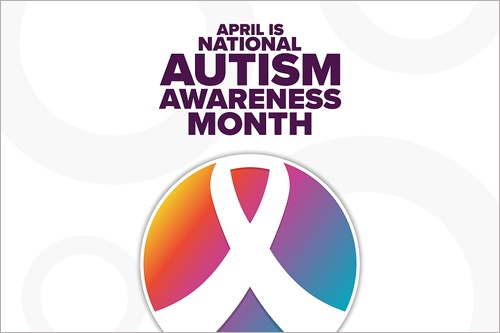 By Brendan J. King
By Brendan J. King
April is National Autism Awareness Month. Traditionally this has been a month of support, outreach and understanding for those dealing with autism. With the COVID pandemic, that support network (families, educational/medical professionals, and members of the community) has become more important than ever.
Now, in April of 2021, there are glimmers of hope on the COVID front. An increasing number of individuals have received vaccine shots, people are starting to hesitantly come out of isolation and children are beginning to return to school. All good news. However, for individuals with autism, these shifts are both welcome and worrisome.
For individuals with autism who had to learn new behaviors during COVID, there is now the challenge of learning more behaviors for what many are calling the “new normal.”
Fortunately, public awareness organizations and social service networks can offer support and advice for those struggling to understand and cope with “What’s next?” This support includes finding legal protection, benefit programs, and social services.
In this uncertain world of COVID, it is important that your special needs child have a carefully prepared estate plan, which includes:
- Last Will and Testament: naming a legal guardian/conservator for your child in the event of your death; without this designation, a judge will decide who will care for your child.
- Durable Power of Attorney: An individual that you appoint who would handle your legal and financial affairs in the event of your inability to do so. If your child has reached age 18 and is able to understand and sign documents, he/she should also sign a Durable Power of Attorney, which could avoid the need for a court-appointed conservator.
- Health Care Proxy: In addition to naming your own health care decision-makers, your adult special needs child may be able to sign his/her own document to name health care agents and possibly avoid court guardianship proceedings.
- Special Needs Trusts (SNT): SNTs come in different forms – first party vs. third party; revocable vs. irrevocable; funded vs. standby. The purpose of these trusts is to allow your child to benefit from assets while ensuring that their health and welfare is maintained through maximum eligibility for benefits such as SSI, Medicaid and other government programs. The goal is to create the best standard of living possible for your child. The funds of the SNT are also protected from creditors, and are earmarked so that they can only be used for the child’s benefit during his/her life.
- Letter of Intent or Statement of Wishes: Although not a legal document, this is your opportunity to describe how to best support and care for your loved one, and to help make the transition from your care to another’s easier. Medical information, foods enjoyed or to avoid, comments about what helps, hurts, scares or reassures your loved one, are among the items that can be included in the statement.
Personally touched by autism within our EPLO family, we are proud that we can help with legal protection for your loved ones with special needs. It is our mission to assist anyone dealing with autism who is in need of our services – whether a phone or zoom conversation, complimentary planning consultation, or resources available on our website (under Special Needs Planning).
Meanwhile – as we honor Autism Awareness Month, EPLO would like to say thank you for allowing us to help.
